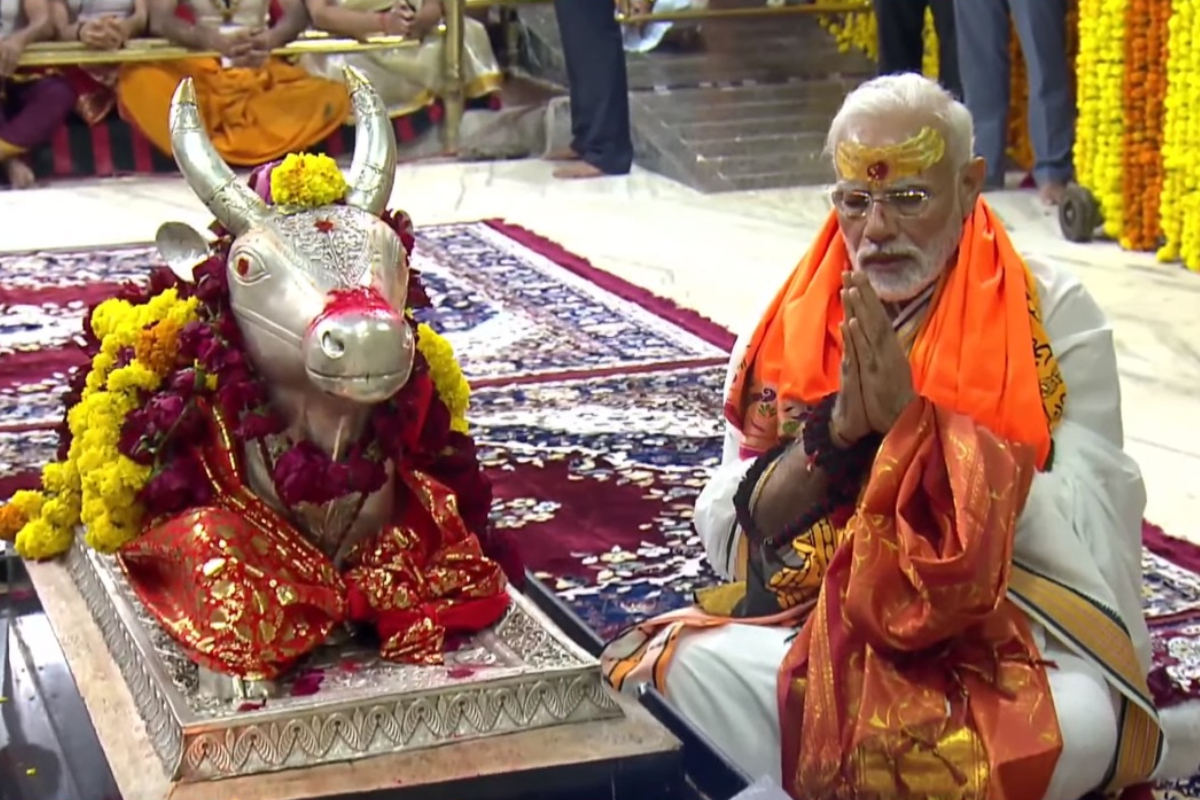August 5, 2020; December 13, 2021, and October 11, 2022, are significant dates in the annals of the Hindu religion and its practices. With Prime minister Narendra Modi inaugurating the grand Mahakal Lok Corridor on Tuesday, October 11, 2021, several revered Hindu shrines have witnessed a complete makeover during his prime ministership. Ever since he took over the reins of the country, he has overseen the revival of important places of worship.
There has been a Hindu renaissance as PM Modi has lent his hand in the restoration of the places of great reverence and also correcting the historical wrongs committed during the rule of the invaders.
From integrating 51 Shaktipeeths (Maa Durga Temples) to laying the foundation stone of the grand Ram Temple in Ayodhya to reclaiming the pristine glory of Baba Vishwanath in accordance with Skanda Purana and creating a magnificent Mahakal corridor in Ujjain.
From rebuilding the Kedarnath Jyotirlinga site post-2013 devastation, the construction of all-weather Char Dham roads linking the four holy sites of Gangotri, Kedarnath, Yamunotri and Badrinath, to the restoration of temples in Jammu and Kashmir.
From the inauguration of a temple in the United Arab Emirates to laying the foundation stone of the Shreenathji temple redevelopment in Bahrain, PM Modi has steadfastly tried to instil a sense of pride among Hindus and also connect them to their roots.
One needs to go back to the December 2021 speech of Home minister Amit Shah during the foundation stone laying ceremony of Maa Umiyadham, the presiding deity of the Kadwa Patidar community in Ahmedabad. Shah had then claimed, “At a time when people were ashamed of places of worship, the government of Prime Minister Modi is restoring the lost glory of Hindu temples with utmost devotion. PM Modi has applied tilak on his forehead and performed the aarti of Maa Ganga as a devout Hindu. I have no hesitation in saying that PM Modi has worked tirelessly to restore forgotten Hindu places of worship”.
It was on August 05, 2020, a date that will remain etched forever among the followers of Lord Ram across the globe, when PM Modi placed the 40 kg silver brick to lay the foundation stone of the Ram Mandir in Ayodhya. The birthplace of Lord Ram is undergoing a complete transformation as PM Modi and Yogi Adityanath, the Chief minister of Uttar Pradesh, are not leaving any stone unturned in making Ayodhya a Hindu pilgrimage site.
The souls of all those who laid down their lives during the Ram Janmabhoomi movement can rest at peace now. Construction of the Ram temple is going on in full swing. In a year or so, PM Modi will get the honour of opening it for the devotees.
Once completed, Ram temple is bound to attract lakhs of pilgrims every month, and the government is engaged in creating facilities and amenities for the pilgrims.
A detailed Ramayana circuit has been planned that will link Ayodhya to all the places where Lord Ram went during his 14-year exile, his battle with the demon king Ravana and then his triumphant return to Ayodhya. Once completed, this circuit will be a boon for the hospitality industry and will create thousands of jobs.
Varanasi, the cultural capital of the country, has faced years and years of neglect and plunder. Its fortunes changed for good once Narendra Modi decided to contest the Lok Sabha elections in 2014. Despite attracting thousands of lakhs of tourists every month, Varanasi lacked infrastructure. PM Modi has not only ensured the all-round development of the city; he has been instrumental in restoring Kashi Vishwanath to its glorious past.
Prior to its restoration, one had to wade through crowded serpentine lanes to reach Kashi Vishwanath temple. PM Modi conceptualised the idea of redeveloping the temple area and connecting it with the river Ganga. According to the Skanda Purana, the gates of Kashi Vishwanath Temple face the Ganga River.
On March 8, 2019, PM Modi laid the foundation stone of the Kashi Vishwanath corridor. The finest details were addressed, starting from the land acquisition and placing idols of gods and goddesses in the re-developed temple complex in accordance with their description in the Kashi Khand of Skanda Purana.
Despite the spread of COVID-19, the project was completed within the stipulated period, and PM Modi opened it for the general public on December 13, 2021, amid chants of Vedic hymns.
Prime Minister Modi also inaugurated the 946 metre long Mahakal Lok (first phase), which is almost four times bigger as compared to the Kashi Vishwanath Corridor in Varanasi. Situated on the banks of the holy Shipra River in Ujjain, Mahakaleshwar Temple houses one of the 12 Jyotirlingas of Lord Shiva.
Mahakal is worshipped as the ruler of Ujjain and holds significance in the Hindu religion and belief. The first phase of the corridor consists of murals and statues depicting the 25 tales of Lord Shiva as mentioned in Shiv Purana, Mahakaleshwar Vatika, Mahakaleshwar Path, Shiv Avtar Vatika, Rudrasagar Lakefront, Dharamshala Complex and Congregation Hall. There are four entrances named Pinaki, Shankh, Nandi and Neelkanth Gates to facilitate the entry of pilgrims and those seeking the divine blessings of Lord Shiva.
There were several temples and places worshipped by the Hindus in Jammu and Kashmir that were neglected by successive regimes. The situation, however, changed after Prime Minister Modi-led government abrogated Article 370. The Jammu and Kashmir administration identified temples and places that needed to be renovated and restored.
Several sites in and around Srinagar have been renovated, along with the much-revered Raghunath temple in Jammu. Apart from these, the government is working on repairing and restoring all temples and shrines in the Union Territory of Jammu and Kashmir that have faced plunder and devastation. This is a process to heal the ruptured psyche and soul and reclaim the past glory of Hinduism.

